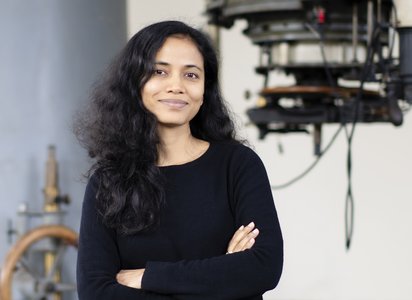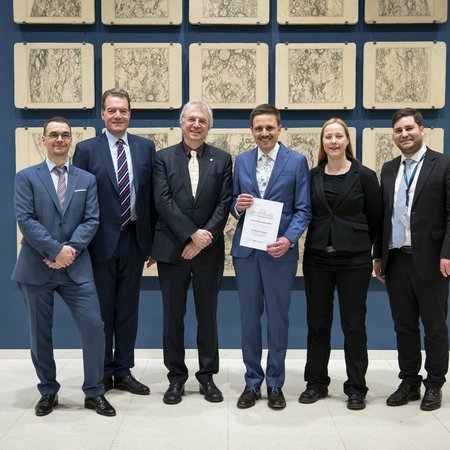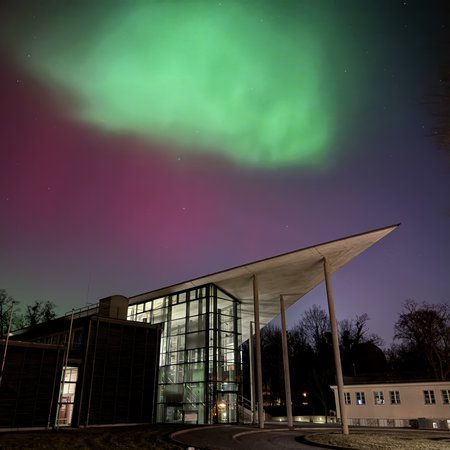Dr Meetu Verma receives the WISER award for a German-Indian tandem project unveiling the Sun’s spinning secrets
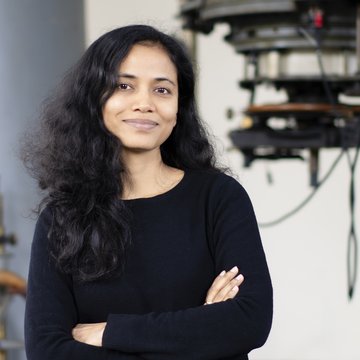
Dr Meetu Verma is one of the winners of this year's German-Indian WISER Tandem Programme.
Credit: Credit: AIP, T.BergemannDr Meetu Verma from the Leibniz Institute for Astrophysics Potsdam (AIP) is one of the recipients of this year's WISER programme, a joint initiative of the Indian government's Ministry of Science and Technology (DST) and the German Federal Ministry of Research, Technology and Space (BMFTR).
Together with Dr Nitin Yadav from the Indian Institute of Technology Delhi, Meetu Verma investigates the dynamics of turbulence structures in the solar atmosphere. The title of her project is “Coupling Multi-wavelength Observations and MHD Simulations for a Comprehensive Study of Solar Vortex Flows”. It combines high-resolution multi-wavelength observations with modern magnetohydrodynamic simulations. In order to better understand the role of plasma flows and magnetic fields in energy transport, the aim of their work is to combine knowledge from observations and simulations and thus develop new strategies for future solar telescope measurements.
‘I am delighted to receive this award as part of the WISER programme. The funding will enable us to conduct even more intensive research into the dynamics of vortex structures in the Sun's atmosphere together with colleagues from India and Germany, and to provide new impetus for future solar telescope measurements,’ says Meetu Verma from the AIP.
The funding is provided as part of WISER (Women Involvement in Science and Engineering Research), a programme launched in 2022 by the Indo-German Science & Technology Centre (IGSTC). WISER aims to specifically empower women in science, technology, engineering and mathematics (STEM)subjects and open up new opportunities for international research partnerships. This year, the initiative is being implemented in tandem format for the first time: 20 German-Indian pairs of researchers, in total 40 female scientists, will receive funding.
The projects will officially start on 1 October 2025. The tenure of the grant will be for a period of three years. It will cover project assistance including research staff, consumables and contingency for the awardees in both countries and one-month research stay in India/Germany.
Further information
https://www.igstc.org/home/wiser_2025
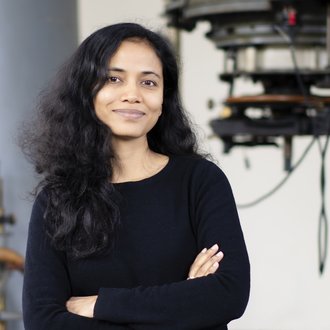
Dr Meetu Verma is one of the winners of this year's German-Indian WISER Tandem Programme.
Credit: Credit: AIP, T.BergemannDr Meetu Verma from the Leibniz Institute for Astrophysics Potsdam (AIP) is one of the recipients of this year's WISER programme, a joint initiative of the Indian government's Ministry of Science and Technology (DST) and the German Federal Ministry of Research, Technology and Space (BMFTR).
Together with Dr Nitin Yadav from the Indian Institute of Technology Delhi, Meetu Verma investigates the dynamics of turbulence structures in the solar atmosphere. The title of her project is “Coupling Multi-wavelength Observations and MHD Simulations for a Comprehensive Study of Solar Vortex Flows”. It combines high-resolution multi-wavelength observations with modern magnetohydrodynamic simulations. In order to better understand the role of plasma flows and magnetic fields in energy transport, the aim of their work is to combine knowledge from observations and simulations and thus develop new strategies for future solar telescope measurements.
‘I am delighted to receive this award as part of the WISER programme. The funding will enable us to conduct even more intensive research into the dynamics of vortex structures in the Sun's atmosphere together with colleagues from India and Germany, and to provide new impetus for future solar telescope measurements,’ says Meetu Verma from the AIP.
The funding is provided as part of WISER (Women Involvement in Science and Engineering Research), a programme launched in 2022 by the Indo-German Science & Technology Centre (IGSTC). WISER aims to specifically empower women in science, technology, engineering and mathematics (STEM)subjects and open up new opportunities for international research partnerships. This year, the initiative is being implemented in tandem format for the first time: 20 German-Indian pairs of researchers, in total 40 female scientists, will receive funding.
The projects will officially start on 1 October 2025. The tenure of the grant will be for a period of three years. It will cover project assistance including research staff, consumables and contingency for the awardees in both countries and one-month research stay in India/Germany.
Further information
https://www.igstc.org/home/wiser_2025
Images
Dr Meetu Verma is one of the winners of this year's German-Indian WISER Tandem Programme.
Big screen size [1000 x 726, 70 KB]
Original size [2725 x 1981, 460 KB]
